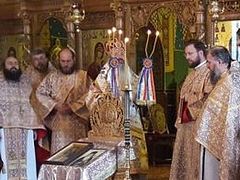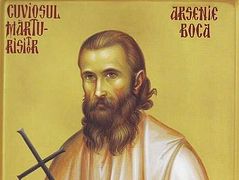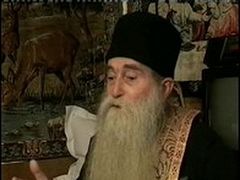On December 2, 1998, the great Elder Cleopa (Ilie) was relocated to Heaven. For the 20th anniversary of his repose, we offer our readers recollections from those who knew him, and firstly, from his spiritual child and co-struggler Elder Arsenie (Papacioc), also a famous Romanian elder.
Archimandrite Arsenie (Papacioc)
“If a hermit has a spiritual father, he needs nothing more”
I was truly delighted and received great benefit when I met Fr. Cleopa one day in the fierce winter of February 1949, and he received me into Sihăstria Monastery, despite the fact that I was being persecuted.[1] I was already a riassophore monk, not a neophyte—I had already spent a couple of years in a monastery. And at one session of the spiritual council, with several of his closest fathers—Paisius, Ionnarie, Cassian, and Macarius—the venerable fathers of Sihăstria—Fr. Cleopa found it necessary to send me into the forest, the desert.
These places were located a great distance from the world and were rather foreign and unknown to me—the forest, mountains and precipices. Then it snowed and a blizzard swept all around for thirteen days without stopping, covering all the paths. They visited me a little while later to see whether I was alive, because no one could imagine that I was still alive. Of course, they found me alive. I was cheerful and alive and received great benefit. I greatly revered them.
I can’t say I was very happy to see Fr. Cleopa in his bast shoes. Fr. Paisius then handed me eighteen pieces of sugar and I asked myself, “Why did they send me into the desert?” First of all, because they knew the deep impact and height of the desert. Here, in the desert, you have to be able to talk to the trees and take benefit from their deep silence and that majestic movement that happens when the winds blow, to understand what great importance there is in steadfastly serving God. Trees have deep roots and in their deep silence you have to be able to hear their great speech.
Then I was taken from the desert and I entered the monastery. I attached great importance to care for salvation, because Fr. Cleopa posed the question not of convenience, but of sacrifice, without which there is no salvation. After all, only sacrifice and the Cross gave Jesus the authority to judge after the Crucifixion.
I inexpressibly strongly cleaved to him with my soul and I’m very glad that I can say that I was educated by such people, led by Fr. Cleopa.
At a certain moment, on Holy Thursday, something happened in the monastery that I had never seen before—the washing of the feet of the disciples. Fr. Cleopa, who was the abbot, sat me in the midst of those who were to have their feet washed. I received great benefit then. Then he ordered that they no longer call me Brother Angel, as I was known in the world, but to address me as “Fr. Angel,” because I was also a teacher there.
Fr. Cleopa caught the intricacies of the lives of the monks. He did not neglect these subtleties, and individually encouraged the potentials embedded in us by God.
The great Cleopa was not without special graces. Whether he preached or was silent, his personality was felt in every movement that took place in the monastery.
At some point I found myself in a difficult situation with him in the forest. We were in a very young forest when we were caught in a merciless torrential downpour. There were thirty to forty yards between us and we could see one another through the thin bushes. He gave me a sign with his hand, telling me to walk towards him, where he thought the brush was thicker, to take cover, because it was impossible to find a place anywhere around where it didn’t pour on you from above. We were soaked through and through.
I hesitated, not wanting to go, because I had also found a place for myself. I told him, but I still went because he insistently called me. And when I had gone twenty or thirty yards, lightning struck the very spot where I had been. And I thought: “You see, that’s what obedience means!” He was inspired by God and insistently called me, who thought I had found a better place, so lightning wouldn’t hit me. And it hit the exact spot where I had just been.
Then we both ran towards one unusually large oak tree, towering twenty to thirty yards above the bush, in an open place, to hide from the rain under it. But we didn’t make it there before lightning struck this oak.
Then we both understood that God had saved us, and we let the rain pour on us as much as it pleased, just to surrender to the will of God. And after this ablution, sent down from above and accepted by us with full love, we embraced one another and understood that God clearly preserves us and helps; but without sacrifice it’s impossible.
Another time when I was in the forest with Fr. Cleopa, we laid down to rest, and I was at the root of one large fir and Batiushka at another just as large, two to three yards from one another. And suddenly, a snake crawled out from the place where I was sleeping and started heading towards Fr. Cleopa. I shouted to him: “Batiushka, there’s a snake crawling!”
He said: “Leave it; let it warm up too.”
We behaved in such a completely sincere way. We didn’t do it for show; that didn’t do it for us—we wanted only one thing: to follow the path of salvation, which is truly for every one of us nothing other than the cross, understanding that the cross is the most praiseworthy thing on earth, which gave the Savior the right to judge.
After some time, lightning hit this fir I was sleeping under, leaving only the stump. It shocked me, but I didn’t want to indulge in suspiciousness, superstition, and abstractions. I looked at everything with complete seriousness, understanding that when you are going through a moment, the main thing is to maintain self-control, so as not to deviate to a dangerous path.
So I was with Fr. Cleopa in the monastery and in the woods and I inexpressibly highly valued his conscientiousness as a servant of God. Of course, his spiritual presence continues even now.
He was very inclined towards asceticism, but as for me, I leaned more towards self-control and sobriety. We had many disputes on this matter, and I would explain to him why it would be better this way.
When we were hiding in the desert, he had one strong desire. He often repeated it to me: that if he died, I should carry him to Sihăstria. I didn’t really believe we were going to die, but I assured him that, in any case, even if I had to drag him, I would take him. And now, when God has judged to take him to Himself—because, I believe, the earth was opened to receive his body, but Heaven was opened to receive his soul—I tell myself, having intensely experienced these moments together with him: “Well, Fr. Cleopa, you died in your monastery so dear, which you considered a true Heaven on earth.”
Then, at some point, when Fr. Cleopa and I were hiding in the desert, he became very popular, and the question was raised at the Synod about monks supposedly trying lead the spiritual life hiding in the weeds. Patriarch Justinian was piqued when he realized there was a great deal of truth in it and he sent two monks for us to take us to Bucharest.
I was living separately from Fr. Cleopa then. We would meet in the forest from time to time. The Patriarch sent Fr. Petronius to me, who is now the abbot of the Athonite Prodromou Skete, and who was my sponsor from the Gospel. They sent Fr. Daniel (Sandu Tudor) to Fr. Cleopa, a great writer who composed the Akathist to the Mother of God “of the Burning Bush,” and a great scientist, who they gave to lead the Rarau Skete. And we went to Bucharest.
Then there were a lot of arrests. It was unprecedented, with eighty-nine officers in three trucks and two cars coming to Slatina Monastery for us.
I was arrested. When they arrested me, Fr. Cleopa disappeared. Years and years later I was released, and they told Batiushka, where he was in, deep in the forest in Bukovina, that I had been released, and he said: “I’ll believe it when I see him!”
Then I went with two hieromonks to the spot where he was hiding in the forest. It was difficult to get there. I was quite exhausted. My stomach had been damaged in prison.
We met, we embraced from the heart, so touchingly, and we had a glass of wine. He said it would make me healthy, and recited, thanks to his great knowledge and wisdom, the words of St. John Chrysostom from his interpretation of the part of the Epistle of the holy Apostle Paul to Timothy about the importance of a glass of wine.[2]
So we brought him out of the forest and went to the monastery with him.
I could have been with Fr. Cleopa for a long time. He had a desire that I couldn’t accept: to disappear into the forest his whole life, because he believed, and it was so, that if a hermit has a confessor, he needs nothing more. And we were confessors for one another, which means we truly had what we needed. The problem of food was not raised because it didn’t interest us.
Then he became more and more famous and inspired to works of great spiritual beauty, for there was nothing you could ask him about that he wouldn’t answer, and nothing that wasn’t clarified in the mind and heart of Fr. Cleopa.
I will tell you that I had great joy and peace in my soul—it’s very important for life and for a monk’s asceticism—joy that such fathers had reared me.
I have honored him my entire life as a great messenger of God to our Romanian land, to our Christian monasticism. These events greatly moved me towards sacrifice, courage, and heroism, without which it’s impossible to be called a hero of Christ.
We saw one another from time to time, and the last time I went to Sihăstria from here, from Techirghiol, in 1996, Fr. Cleopa earnestly entreated me to come when he dies, for a last blessing.
“And if I invite you to my death?”
He didn’t accept this.
I have remembered Fr. Cleopa my entire life. I remember him not from some customs or traditions—“Great Cleopa!”—but I remember him as a servant of God for more than seventy years, who with all his strength told people what was necessary to hear about our sacred salvation, that is, about eternal life, about that joyous meeting around our good God.
He looked at death as a necessity, as a warrior, teaching people the ability to die, as I told one general who suggested that I stay in the army when I was serving. He asked me what I would do with a subordinate officer if I became a general and was given command. I answered him: “I would teach them how to die.”
Fr. Cleopa was a hero; he spoke to people as if he were speaking for himself, because when you speak that way, it’s tested by your conscience, and—it’s hard to say everything about him—he had this conscience.
Mrs. N. N.
“Fear no one, nothing, never—and pray!”
Fifteen years ago, I entered the cell of Fr. Cleopa together with my entire family.
He spoke a lot, meekly, gently, like no one else. He could hear us; he could cheer us up with his unique and unforgettable, “May Paradise consume you!”
After that, I visited Batiushka many times and every time received help from him and was amazed by the clairvoyance he was empowered with by God.
Once I asked him: “Batiushka, how do you know everything that will happen?”
And he answered: “Prayer climbs the rungs of holiness. The more you pray, the more and better you know. And fear no one, nothing, and never—and pray! The Lord and the Mother of Light see you and hear you—you pray.”
This is how I was convinced that Batiushka was right.
My boss greatly valued me for a long time—fourteen years and I did nothing wrong. But one day he told me he thought I was more beautiful than ever and he wanted to get to know me better. Neither my excuses nor a reminder that we were in the strict Lenten fast worked, and he threatened me: “If you don’t carry out this order by 12:00 PM Saturday, you won’t work in this organization anymore.”
I pleaded with him about only one thing: “Pity yourself and your family!”
And to this day I don’t know where I got the idea to say such words.
I went home and wept before the icons and started to pray to God, the Mother of God, St. Nicholas, and St. Menas.[3]
On Saturday at 12:00, when I, a bit nervous, was pacing back and forth through the office, from the window to the door and back, I suddenly saw an ambulance and the man who threatened me being rolled into it.
Weeping, I went to Fr. Cleopa, because I didn’t want him to die, and Batiushka told me: “Sister E., don’t cry. Through you the cup of his iniquities has overflowed, and God will not endure him anymore. Soon you will know the truth!”
Then somehow I found out from someone that he spoke to women poorly, and from another woman (who didn’t see me at his funeral) I found out that she was also fired from the service because she didn’t comply with his orders.
Nun N.
The unburned photo
On Saturday evening, April 17, 2004 (in Bright Week), at about 9:00 PM, after the service, a devastating fire engulfed the Suzana Monastery in Prahova County. Two buildings and several sheds burned down. And the cell of Sister G. burned, who tells the following:
“I wasn’t home, and as the firefighters began to extinguish the cells that were closer to the church, no one broke into my cell to fight the fire. And everything burned: the bed, table, dresser, floor, and the roof covered with shingles. I found the roof rafters, made out of firs, collapsed in the cell along with the ceiling, which I had recently barely managed to repair,” adds Sister G., without a shadow of regret for the damage. “I was knee deep in burning embers!”
Sister G. also recalls:
“I never met Fr. Cleopa personally, but I greatly revered him, listening to his cassettes and reading his books. Fr. Cleopa would say that a monk jumps towards salvation like a grasshopper. People walk like normal, but a monk jumps, like a grasshopper. I think these words of Batiushka instilled a love for the monastic life in me.
“Before holy Pascha, to inspire purity, I hung a photograph of Fr. Cleopa on the wall above my bed, telling myself that when he is canonized I’ll hang it on the eastern wall of my cell. It was a simple color photograph on cardboard, wrapped in film, size A3.
“When I returned home after the fire, I met with Mother I., whose cell also burned, and I told her: ‘Well, what can we do, Mother, if it pleased God?!’ and then I asked her, ‘Is there anything left in my cell?’
“Mother I. answered: ‘Nothing! You’re left with Fr. Cleopa alone!’
“I didn’t immediately understand what she wanted to say. Only later did I find out that the photograph of Fr. Cleopa was still hanging on the wall, untouched by the fire. The firefighters were amazed by this.
“I don’t understand how it managed not to burn. It was just simple cardboard on a wall, over the bed. There wasn’t even a frame. And the bed had a woolen mattress and blanket, also woolen, and they burned up completely with the bed. Can you imagine the flames that must have been blazing there? And the icon of the Dormition of the Mother of God didn’t burn. It was also paper, but in a frame. I found it among the firebrands, untouched by fire, while the windowpanes had burst and melted along the edges from the fire.”











